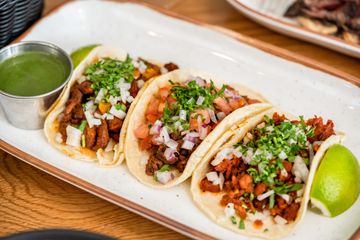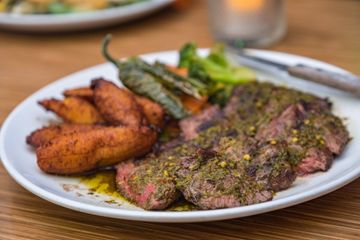Is Mexican Food Healthy And Balanced? Unboxing the Nutritional Benefits of Conventional Components
The question of whether Mexican food is healthy invites an expedition of its conventional components. Beans and corn act as fundamental staples, rich in protein and fiber. Avocados offer advantageous fats, while various herbs and seasonings include flavor and health benefits - lunch and dinner. Together, these parts create a tapestry of nourishment. Nonetheless, the healthiness of Mexican food frequently relies on prep work methods and section sizes. What function do these factors play in identifying its total nutritional worth?
The Power of Beans: Protein and Fiber-Rich Staples
Although often overlooked, beans work as a foundation of Mexican food, offering a riches of nutritional advantages. Rich in protein, they are an outstanding plant-based option for those looking for to satisfy their nutritional healthy protein needs. This high protein content sustains muscular tissue repair service and growth, making beans invaluable for both meat-eaters and vegetarians alike. Furthermore, beans are an outstanding source of dietary fiber, which helps in digestion and advertises a sensation of fullness, potentially aiding with weight management.
The selection of beans used in Mexican dishes, such as black beans, pinto beans, and kidney beans, contributes to a varied taste profile and can boost dishes nutritionally. Moreover, beans are reduced in fat and contain vital minerals and vitamins, consisting of iron, folate, and magnesium. Together, these attributes make beans an essential active ingredient, providing both nutrition and food in traditional Mexican fare.
Corn: a Versatile Grain With Nutritional Perks
Corn attracts attention as a versatile grain fundamental to Mexican food, commemorated not only for its cooking applications but also for its outstanding nutritional account. As a main active ingredient in recipes like tortillas, tamales, and pozole, corn supplies important nutrients that add to a well balanced diet. Rich in carbohydrates, it works as a significant energy resource, while also being low in fat, making it a beneficial option for numerous dietary needs.
Corn is a good source of nutritional fiber, which assists in digestion and advertises satiation. It has considerable amounts of vitamins such as B-complex vitamins, which are vital for basal metabolism. The presence of anti-oxidants, particularly carotenoids, adds to overall health by decreasing oxidative stress and anxiety. Additionally, corn is gluten-free, satisfying those with gluten sensitivities. Overall, the dietary advantages of corn underscore its relevance in typical Mexican food and its function in a healthy and balanced diet.
Avocados: Healthy Fats and Nutrients in Every Bite
Avocados play a considerable role in Mexican food, matching recipes with their creamy texture and abundant flavor. Beyond their culinary appeal, avocados are commemorated for their remarkable nutritional account. They are a rich resource of healthy monounsaturated fats, which can aid reduced negative cholesterol levels and support heart wellness. Additionally, avocados are loaded with vital vitamins and minerals, consisting of potassium, vitamin E, and B vitamins, adding to general wellness.
The high fiber content in avocados help digestion and advertises satiation, making them a helpful enhancement to any meal. Their unique nutrient structure can additionally support skin health and wellness and give anti-inflammatory advantages. Integrating avocados into conventional Mexican dishes or enjoying them as a standalone snack can enhance both flavor and nourishment, showing why they are a cherished staple in Mexican food. Generally, avocados offer a tasty way to enjoy healthy and balanced fats and essential nutrients in every bite.

Herbs and flavors: Flavorful Wellness Boosters
While enjoying the abundant tastes of Mexican food, one can not neglect the essential role that spices and natural herbs play in enhancing both taste and wellness. Active ingredients such as chili, oregano, and cilantro peppers not just add to the vibrant taste account however additionally give substantial health benefits. Cilantro is understood for its cleansing buildings, aiding to eliminate hefty steels from the body, while oregano is packed with antioxidants and possesses anti-inflammatory impacts.
Chili peppers, a staple in numerous Mexican recipes, have capsaicin, which has been linked to boosted metabolic rate and pain relief. Additionally, flavors like cumin and coriander assistance digestion and may help in blood sugar level regulation. Including these delicious health boosters right into meals not only enhances the cooking experience yet also promotes overall health, making Mexican cuisine not simply delicious, yet likewise nutritionally advantageous.
Standard Food Preparation Techniques: Enhancing Nutrition and Taste
Standard food preparation methods in Mexican cuisine play a necessary duty in enhancing both nutrition and taste, as they frequently prioritize classic strategies and fresh active ingredients. Strategies such as nixtamalization, where corn is soaked and prepared in an alkaline remedy, not just enhance the nutrient profile of tortillas however additionally enhance their digestibility - tacos. Furthermore, making use of slow food preparation methods, like cooking or braising, permits tastes to fuse magnificently while preserving the integrity of the ingredients

Regularly Asked Concerns
Are Mexican Food Portions Normally Larger Than Various Other Foods?
Mexican food portions are typically larger than those of many various other cuisines. This characteristic mirrors standard dining practices, emphasizing common sharing and hearty meals, which can bring about a more substantial serving dimension generally.
How Does the Prep Work Approach Affect Healthiness of Mexican Food?
Prep work methods greatly influence the healthfulness of Mexican food. Strategies such as grilling or steaming preserve nutrients, while frying can enhance harmful fat material. Options of components and cooking designs eventually establish overall nutritional value.
Can Mexican Food Be Customized for Specific Dietary Restrictions?
Mexican food can indeed be customized for certain dietary restrictions. Substitutions, such as using corn tortillas for gluten-free diet plans blog or including even more vegetables, make it possible for individuals to appreciate typical flavors while fitting numerous dietary needs.
What Are Common False Impressions Regarding Mexican Food and Health?
Typical false impressions concerning Mexican food consist of the idea that it is inherently undesirable, excessively hot, and solely concentrated on fats. Actually, traditional recipes frequently feature nourishing active ingredients and can be tailored to various dietary requirements.
Exist Much Healthier Alternatives at Mexican Dining Establishments?
Healthier alternatives at Mexican restaurants typically top restaurants near me include smoked meats, beans, and fresh veggies. Picking meals that highlight whole ingredients and preventing heavy sauces can lead to a more nourishing dining experience, promoting overall health.
The selection of beans utilized in Mexican dishes, such as black beans, pinto beans, and kidney beans, contributes to a varied flavor profile and can boost meals nutritionally. Avocados play a significant role in Mexican cuisine, matching recipes with their velvety structure and rich flavor. Including avocados right into standard Mexican dishes or enjoying them as a standalone treat can enhance both flavor and nourishment, demonstrating why they are a cherished staple in Mexican cuisine. While enjoying the rich flavors of Mexican food, one can not ignore the important duty that spices and natural herbs play in enhancing both taste and wellness. Typical cooking techniques in Mexican food play an important duty in boosting both nourishment and taste, as they typically prioritize time-honored Click This Link strategies and fresh active ingredients.